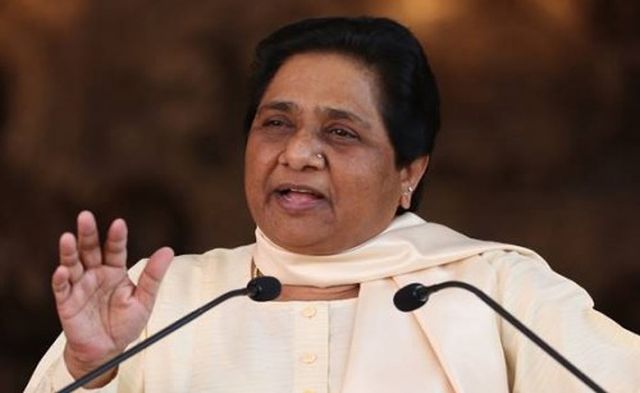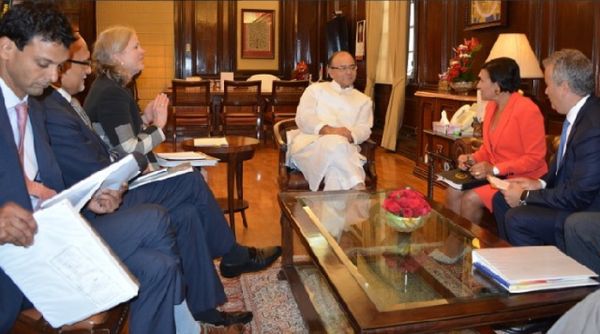
by admin | May 25, 2021 | Employment, Government Jobs, News, Politics
 Lucknow : Bahujan Samaj Party (BSP) supremo Mayawati on Tuesday batted for reservation in government jobs for the economically weaker upper castes and Muslims and other minorities.
Lucknow : Bahujan Samaj Party (BSP) supremo Mayawati on Tuesday batted for reservation in government jobs for the economically weaker upper castes and Muslims and other minorities.
She said if the Modi government brought a Bill to give 18 per cent or more reservation to the poor from the upper castes, Muslims and other minority groups, her party will be the first to support it.
Welcoming the passage of The Scheduled Castes and Scheduled Tribes (Prevention of Atrocities) Amendment Bill, 2018 in the Lok Sabha, the four-time Uttar Pradesh Chief Minister also expressed hope that the Bill will sail through the Rajya Sabha comfortably.
She, however, credited the pressure built by her party and the sacrificeS of the Dalits who participated in the April 2 ‘Bharat Bandh’ for the development.
“The voice of the Dalits and the marginalised along with the BSP cadres forced the government at the Centre to bring in this Bill,” Mayawati said.
She pointed out how an NDA Minister (Ram Vilas Paswan) was forced to announce a sit-in to compel the government to act against the dilution of the SC/ST Act by the Supreme Court.
She, however, slammed other leaders of parties in the National Democratic Alliance government for keeping mum on the issue that was close to the heart of millions of Dalits.
—IANS

by admin | May 25, 2021 | Employment, Government Jobs, News, Politics
 New Delhi : The creamy layer ceiling for Other Backward Classes candidates for securing government jobs was on Wednesday raised to Rs 8 lakh as the union cabinet cleared a proposal for a commission to work out sub-categorisation within OBCs for a “more equitable distribution of reservation benefits”.
New Delhi : The creamy layer ceiling for Other Backward Classes candidates for securing government jobs was on Wednesday raised to Rs 8 lakh as the union cabinet cleared a proposal for a commission to work out sub-categorisation within OBCs for a “more equitable distribution of reservation benefits”.
Union Finance Minister Arun Jaitley said after a cabinet meeting here that OBC families earning up to Rs 8 lakh per annum will not be considered in the creamy layer. Earlier, this ceiling was Rs 6 lakh per annum.
“The cabinet was apprised that the creamy layer criterion limit has been raised to Rs 8 lakh annually for the central government,” he said.
Asked if the raised limit will also be applicable to public sector undertakings, Jaitley said the issue was under “active consideration of the government”.
Jaitley said the cabinet approved a proposal for setting up of a commission under article 340 of the Constitution to examine the issue of sub-categorisation of the OBCs.
He said the commission will examine the extent of inequitable distribution of benefits of reservation among the castes or communities included in the broad category of OBCs, with reference to the OBCs included in the Central list.
It will work out the mechanism and parameters for sub-categorisation within such OBCs, identify the respective castes or communities or sub-castes in the central list of OBCs and classify them into their respective sub-categories.
“With this, those in the broad category of OBCs who were till now devoid of benefits of reservation, will get the benefits. There will be more equitable distribution,” he said.
The commission will submit its report within 12 weeks from the date of appointment of the Chairperson.
Jaitley said the National Commission for Backward Classes had given its recommendation in 2011 that there should be sub-categorisaion and the Parliamentary Standing Committee had also given such a recommendation.
The Supreme Court, in its November 1992 order, had observed that there is no Constitutional or legal bar to a state categorising backward classes as backward or more backward.
The Minister said 11 states have already implemented the sub-categorisation for state level services. These are Andhra Pradesh, Telangana, Bihar, Jharkhand, Puducherry, Haryana, Karnataka, West Bengal, Maharashtra, Tamil Nadu and Jammu and Kashmir (for Jammu region).
On whether the government is going to review the reservation mechanism, Jaitley said: “There is no such proposal… there will be no review.”
On caste census, Social Justice and Empowerment Minister Thawarchand Gehlot, who was also present at the press meet, said the information about the census is with the Home Ministry.
He said the central OBC list has over 5,000 castes and communities.
—IANS

 Lucknow : Bahujan Samaj Party (BSP) supremo Mayawati on Tuesday batted for reservation in government jobs for the economically weaker upper castes and Muslims and other minorities.
Lucknow : Bahujan Samaj Party (BSP) supremo Mayawati on Tuesday batted for reservation in government jobs for the economically weaker upper castes and Muslims and other minorities.
